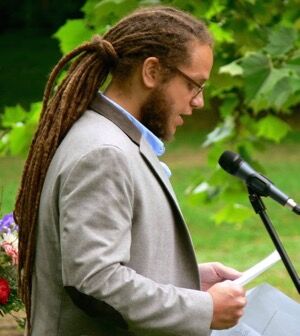I can’t understand, after years of reading, the relevance
of metaphysics. How does it account for the wants of my mind
breaking apart my body? I prefer to think of poppies,
the variety fated to bloom blood-red. Or, of planting poppies,
any flowers in truth—how they come to us in plastic pots; how
after we shovel them a place in the earth, we extract
the flowers from their vessels; how while we lower them down
into their potting hole, ganglionated roots and the dirt compacted
around those roots retain the container’s shape. I am interested
in the shape of things. Is that the relevance of metaphysics?
You know I’m hiding again, don’t you? Still the boy
between the cedar and the wedge of stone wall where, lying flat,
he cannot be seen from the first house his parents ever owned.
I am hiding because I am tired of broken promises,
my country’s and my own. I thought we promised never again
to clothe bodies, especially of children, in chain link.
But here we are. And me, I promised to jettison the anger
that howls away at those, especially the children, I mean to keep
closest to me. But here we are, anger not exorcized,
stashed instead on a high shelf, loaded and with the safety off.
I need that anger—brandishing it I feel most electric and alive.
That’s not quite it, but I cannot make the story only about me:
we would not let a woman and a man and their sons
walk across a bridge. Or, if we had, when they arrived,
we would have outfitted the boys in that broken promise
of fence. I can’t understand what we feared. Maybe
that we’d fall out of love with a country that never was
as we imagined it? Maybe that we’d fall out of love
with ourselves? The sons gathered between the woman
and the man, the four hitched arms and waded
into the water we’ve decided separates that place from
this place. As the four experienced it, swollen and churning
with a confluence of spring rain, the river was both real
and abstract. You know the resolution: water suddenly high,
wrench of undercurrent, the boys drowned. The first son
washed into a backwater matted green with reeds eroded
out of their soil. Where, downstream and returned
to the other place, the second son floated to something like rest,
soda cans bobbed with him in the shallows. As the mother
and the father could not, I am afraid that I cannot protect
my children. I use anger to keep myself, and them, alive.
This is wrong. I am wrong also to make the story of the woman
and the man and their sons about me. I made a different promise
never to masquerade in stories not my own. But I hid behind them,
their story, as I hid behind metaphysics, poppies, anger, a cedar,
and fear. I hope it matters, although I suspect it doesn’t,
that I broke this promise in good faith: their story
is not my story, but if I don’t see myself in them—the four
in the water and not on the bridge—what do I stand
in relation to? what are my properties? what shape am I in?
